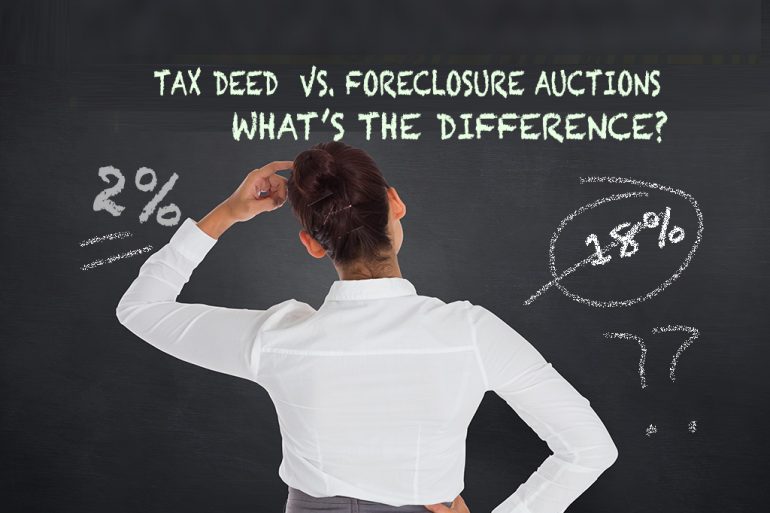Tax Deed vs. Foreclosure Auctions: What’s the Difference?
One of the questions that comes up frequently when I teach about tax deed sales and county foreclosure auctions is “What is the difference?” Well, I’m here as “Professor Tax Deed” to break it down for you.
Tax Deed Auction Sale Basics
A tax deed sale is an auction for tax defaulted properties. To understand how a property becomes tax defaulted and sent to auction, check out my previous article on tax lien investing. Tax deed sales start bidding at all past due taxes, interest, fees, and penalties. Let’s use an example with round numbers.
A hypothetical property owner owes $900 a year in taxes in the state of Florida. A tax lien is issued in the beginning of June the following year for $1,000 because of fees that were added so the county could pay for advertising and mailing. This tax lien is earning 18% interest APR accruing at 1.5% per month.
If Investor A purchases the lien on this property, they must wait out the two-year redemption period in order to initiate foreclosure. During that two-year period, interest continues to accrue on Investor A’s lien. More taxes are due each year, creating additional tax liens. These additional tax liens are called the “roll up.”
At the end of the two-year redemption period, Investor A is owed $1,360 for their tax lien. The subsequent lien purchased by Investor B is valued at $1,180. The current year is just being created for $1,000.
Investor A will now initiate a tax foreclosure by paying the roll up — which totals $2,180 —making their total investment to date $3,180. They have paid Investor B all monies owed. Now they are owed $3,540 in total outstanding taxes. In addition, Investor A will pay approximately $1,000 in fees that do not bear interest but are recoupable. This brings the total owed to Investor A to $4,540.
The property is now ready for the deed auction. More interest will be added to this number, but to keep things simple, let’s assume the tax deed auction starts tomorrow. The bidding will begin at $4,540, and with the first bid, Investor A will be paid in full. Any monies left over will start to pay back any judgments and other liens on the property. Once fulfilled, the remainder will go to the homeowner.
What Assumptions Can We Make About This Property?
Most homeowners’ taxes are paid through their mortgage. The taxes (PITI) are typically paid through an escrow account. For most tax defaulted properties, it’s likely that the mortgage was already paid off or the property was purchased with cash.
If a property has had a 30-year mortgage and paid it in full, it is fair to assume that the structure on this property may be older than 30 years. As you peruse the PropertyOnion.com tax deed auction listings, you can see that most (not all) are properties that were built prior to 1990.
This is one big difference between tax deeds and foreclosures. A lot of these properties may be in a state of disrepair and, as a result, tax deed properties generally sell between 50–60% of market value at auction.
Tax Deed Sale Land Ahoy!
Another glaring difference between tax deed and foreclosure sales is the almost unimaginable amount of vacant land. Vacant lots can be great for someone who wants to get into these auctions but is on a budget.
You can purchase the vacant lots and sell them on “land contract” to someone interested in using the space to park an RV or storage or even build a house. Land contracts are similar to rent-to-own homes in that they require a down payment and monthly installments until they are paid off.
If you are doing a land contract, quieting the title may not be a necessity, but talk to your attorney to decide what is best for you. The combination of buying the right vacant lots at tax deed auction and selling them on land contracts can be very profitable.
What’s in the Margins?
The properties that you often see in tax deed sales typically have higher profit margins than a foreclosure sale. While the primary risk in a foreclosure is surviving liens, the primary risk in a tax deed sale is the condition of the property (although liens must be researched).
I want to be clear when I say ALWAYS check what other liens are on the property and on the other side of the statement. Foreclosures are not always in great shape. It is not unheard of to see 50% returns on tax deed properties just by going through old auctions and seeing where the properties are today. Some of these properties are listed “as is,” but if someone undertakes a full rehab or had to pay any surviving encumbrances, the margins are not so clear.
In other words, you can see what the property sold for at auction and if/what the property has sold for since the auction. However, what happens between auction and sale of the property may have a big effect on the profits.
Municipal liens can be an unexpected surprise. If you are buying a tax deed, please keep in mind that any other government-issued lien will have to be dealt with at some point, legally or financially. Have a good attorney to quiet the title and make sure you are prepared for any road bumps.
Foreclosure Auction Sale Basics
A foreclosure sale is the sale of a property that was forced by a lien holder other than a tax lien. Unlike a tax foreclosure, this is a judicial foreclosure which requires the court to make a judgment for the plaintiff (i.e., a bank or HOA). I am going to make some generalizations to simplify this process.
In a foreclosure sale, there is a plaintiff that has been awarded a sum of money (noted as the final judgment amount). A document that coincides with this judgment details how they came up with the number to be awarded to the plaintiff.
Let’s say that the Bank of PropertyOnion.com (BPO) gave a mortgage on a property in the amount of $100,000 at 6% for 30 years. Over the course of 30 years, with all payments made on time, BPO will receive $215,838.19 in payments. If the property owner defaults 10 years in, BPO will file to foreclose and ask the court to be made whole with all the interest, any legal fees, and additional expenses.
The court agrees that BPO should be paid in full and will give judgment in favor of BPO in the amount of $180,000, assuming that is what they are owed. This final judgment can include attorney fees, interest to date, appraisal fees, and more. The property will then be auctioned off. BPO is allowed to set a maximum bid prior to auction.
When they set this bid, they are telling investors, “This is what you will need to come up with as a minimum in order to win this property.” Banks have the ability to hide their maximum bid to maximize the number of bidders on a property. At the end of the day, BPO just wants to be made whole, whether that is through a bid high enough to satisfy them or by taking the property to market themselves to get a higher return.
What Assumptions Can We Make About This Property?
Again, I’m using generalizations based on my experience. A large portion of these properties are mortgaged and may be newer. Properties that are mortgaged may be better taken care of than a property that was left to the heirs in a family, which happens quite often in tax deed foreclosures. In general, foreclosure properties will be in better condition and newer than tax deed properties.
We often see HOA foreclosures going up for sale. A property with an HOA may have be better maintained than one that does not; however, an HOA foreclosure may have a surviving mortgage, and the bank will not just go away. I always recommend pulling a title search before bidding on a foreclosure or tax deed sale — always, no exception!
What Does All of This Mean for You at the Auctions?
When deciding whether a foreclosure or tax deed is right for you, you must consider the key differences between them.
In a foreclosure sale, you have the ability to see who is included in the judgment. This may help you see what other lien holders are being added into the judgment. The greatest benefit to the tax deed sale is that you know that any private liens on record have been sent the tax deed application notice, giving them an opportunity to keep their lien in a priority position by paying the taxes owed.
Municipal or government liens have the ability to stay with the property through the transfer of the deed, but they will draw on excess proceeds to satisfy themselves. If there is not enough difference between the opening bid and the winning bid to satisfy any government liens, then you will be required to either pay or negotiate the outstanding liens. This is another reason why it is important to do your due diligence and make sure you are calculating what your minimum bid would need to be to satisfy any outstanding municipal liens.
The other big difference between the two processes is that you receive a certificate of title from a foreclosure sale. A tax deed has an unmarketable title, and you need to go through the process of quieting the title to offer a warranty deed at a future sale, with some exclusions.
Exercise Due Diligence and Choose Wisely
The bottom line is that due diligence is the key to whatever castle you choose to conquer. Foreclosure sales and tax deed sales both carry risks, but educating yourself allows you to prepare for the unknowns and have a better chance of success.








